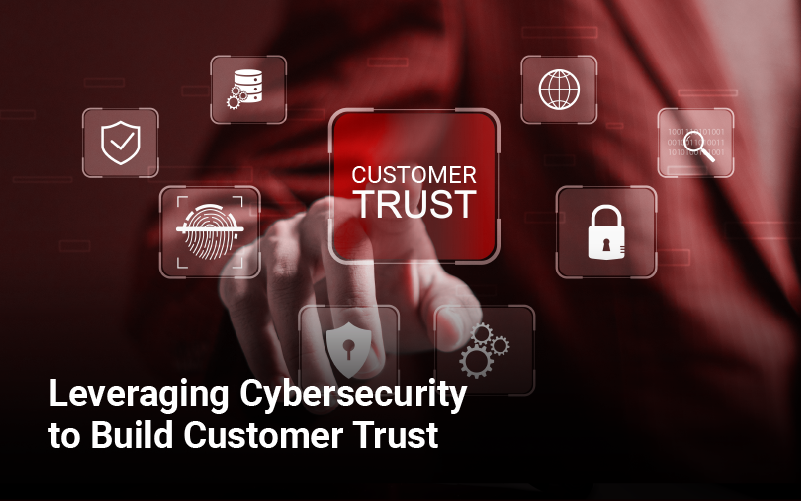Building Customer Trust through Cybersecurity Initiatives
Building trust in cybersecurity is essential for protecting sensitive and personal information, maintaining customer trust, preventing data breaches, protecting brand image and reputation, and so on. As cyber risks can directly affect customer relationships, implementing and communicating business security initiatives has become a part of the organizational lifecycle. This blog aims to discuss the relationship between cybersecurity and customer trust, how to leverage and communicate cybersecurity initiatives to enhance brand goodwill, and why transparency on security measures is important.
The Relation Between Cybersecurity and Customer Trust
As more businesses are undergoing digital transformation, the cyber environment is increasingly becoming susceptible to evolving cyber risks. Heavy reliance on technologies like AI integration or cloud computing provides efficiency to businesses, providing opportunities for cyber attackers to exploit vulnerabilities. As technologies are getting advanced, attackers are deploying sophisticated methods, making it challenging to safeguard the digital environment. When companies fall victim to any cyber incident customers lose trust in the organization’s capability to safeguard their information with them. The loss of faith leads to the deprivation of customer engagement, eventually affecting the brand reputation. Hence, addressing these cyber incidents with effective security measures help maintain the trust and confidence of customers for business continuity. By acknowledging the relationship between cybersecurity and customer trust, businesses can implement effective security measures. Also, by communicating about their security initiatives, businesses can safeguard their reputation before it tarnishes relationship with their customers. Transparency regarding cybersecurity measures can instill confidence in customers and build brand goodwill in the future.
Leveraging Cybersecurity to Gain Customer Trust
Undervaluing customers’ trust in cybersecurity in the era of digitization can prove detrimental. An effective measure to gain customer trust is investing in effective cybersecurity measures. To understand what kind of solutions businesses can implement, here are some best practices:
- Data Protection: In a recent survey, 20% of C-suite leaders mentioned data protection as their top priority to gain customer trust (PwC, 2024). Protecting customer data involves deploying several encryption protocols and data management methods. By committing to these security practices, businesses can assure their clients that data protection is their priority, reflecting a sense of security.
- Secured Payment Gateways: Companies that sell their products or services online can utilize secure payment gateways to protect sensitive information. By trusting reliable payment providers, companies can ensure security, build customer trust, and increase the chances of conversions.
- Authentication Protocols: Authentication protocols include multi-factor authentication and the recommendation of strong passwords to customers to reduce the risk of unauthorized access. Encouraging customers to use complex passwords (with numbers, and special characters) can enhance security. Nowadays, companies even use authentication methods like biometrics or facial recognition for better security and a wholesome user experience.
- Incident Response Practices: If companies can keep a defined incident response plan, they can ensure quicker crisis management in case of a cyber attack. This reduces the possibility of damage that could happen and maintains trust in customers. It is recommended that a set of guidelines and pre-defined responsibilities within the team be kept managing the situation in case of a breach.
- Third-Party Resources: Companies sell information to third parties. But with information lies customers’ trust. When this information falls into the wrong hands, companies face crises – customer dropout, financial damage, legal actions, and reputational damage. Hence, while collaborating with third parties, companies need to share a strict code of conduct to safeguard their and customer data.
Why is Transparency on Security Measures Important for Customer Trust?
For companies to gain customer trust, providing quality products or services is not enough. They need to make their consumers feel safe and valued. If businesses can provide a clear understanding of how customers’ data is protected or what safety measures they are implementing to protect them, customers feel confident investing in the company. By being transparent about their security measures, companies reflect their accountability and reliability to gain customer trust. But how can companies be transparent and gain trust if the customers don’t engage? Companies need to communicate how they are determined to make cybersecurity their priority.
Communicate Cybersecurity Policies and Initiatives for Customer Trust
Acknowledging the importance of implementing cybersecurity measures is not enough. Companies need to make strategies to communicate about the measures they are taking for their customers. Here are some of the ways how firms can roll out to help build customer trust:
- Safeguarding Data: Companies can give customers control of their data protection. Additionally, every security initiative that relates to customer data needs to be conveyed to them. A few companies even show how their security networks encrypt data. It is a great way to catch customers’ attention and gain their trust.
- Third-Party Vendors: Companies should be transparent about who their third-party vendors are when the need be so that they can do vendor-vetting for security purposes.
- Releasing Reports: Periodically, if companies can publish their security reports consisting of their initiatives and programs to foster security, they can build customer trust.
- Feedback Portal: Companies can provide a feedback portal to get customers’ perspectives on their security policies. This also gives companies a chance to check loopholes and improve further.
- Post on Socials: Broadcast on social media channels how the company is educating its employees to maintain cybersecurity. This shows the company’s existing and potential customers’ dedication to security measures.
- Display Security Credentials: The security certifications are validated by accredited organizations, portraying the company’s allegiance to maintaining high-security standards.
Conclusion
For any business leveraging digital platforms, cybersecurity is imperative to win customer trust. Security measures safeguard sensitive data, protect companies from cyber hazards, help predict cyber threats, and foster a sense of reliability among customers. By prioritizing cybersecurity and transparency on security measures, companies can showcase their commitment to customer safety. These efforts, beyond doubt, will mitigate risks and earn customer trust.
References:
PwC. 2024. 2024 Global Digital Trust Insights Survey: GenAI for Cyber Defence is on the Rise
https://www.pwc.com/gx/en/issues/cybersecurity/global-digital-trust-insights.html







